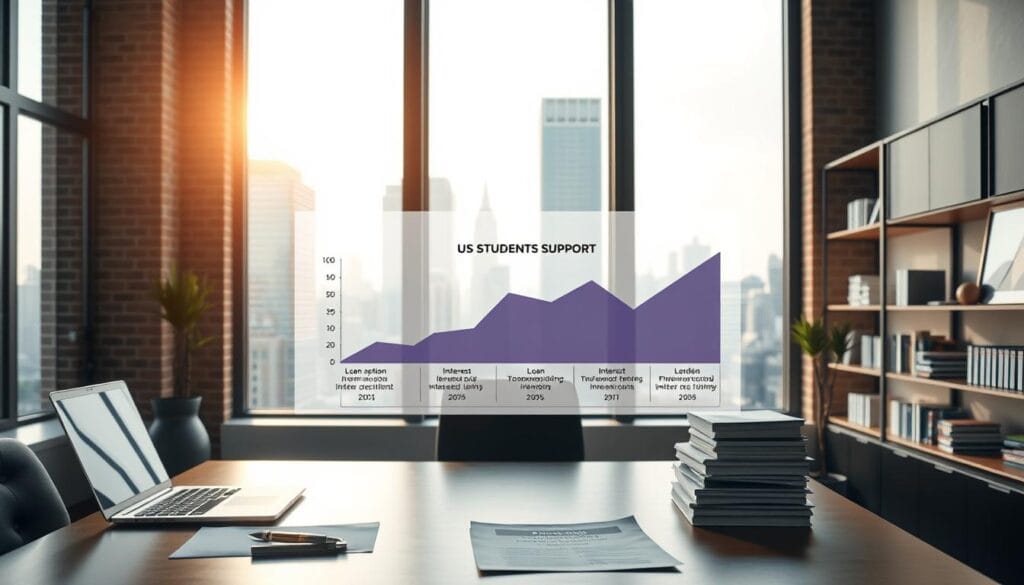44 million borrowers in the United States owe $1.7 trillion in student loans. This shows the need for students to look at all funding options, like the best private loans for college. With college costs going up, private loans are key for many students. Knowing about private student loans can help students reach their goals.

Key Takeaways
- Private student loans can help fill the funding gap for college students.
- Best private loans for college offer competitive interest rates and flexible repayment terms.
- Students should explore all available college loan options before making a decision.
- Private student loans can be used to cover education-related expenses, including tuition, fees, and living expenses.
- Understanding the benefits and drawbacks of private student loans is key for making a good choice.
Understanding Private Student Loans in Today’s Market
Private student loans are key for students funding their education. It’s important to compare rates and know the differences between federal and private loans. Refinancing student loans is also a big choice for many.
When looking at private student loans, students should think about the good and bad sides. Important things to look at include interest rates, how long you have to pay back, and extra benefits. Knowing these can help students choose the best loan for them.
Differences Between Federal and Private Loans
Federal loans usually have better terms, like lower interest rates and flexible payback plans. But, private loans might offer more money and quicker approval. Students should look at both federal and private loan terms to compare rates.
Current Market Trends in Private Student Lending
The private student loan market keeps changing, with new lenders and products coming out. Students should keep up with market trends and refinancing news to make smart choices for their money.
Why Students Choose Private Loans
Many students pick private loans for their flexibility and personal options. By comparing rates and finding the right loan, students can get funding that fits their needs. Private loans can help with extra costs or refinancing existing loans.
Understanding private student loans is key for students funding their education. By looking at interest rates, payback terms, and extra benefits, students can make smart choices. This helps them find the right loan for their education goals.
Latest Interest Rate Developments for College Loans
When looking at best private loans for college, interest rates are key. They affect how much you’ll pay back. Students and their families need to know about the latest rates to choose wisely.
Interest rates for private student loans vary. They depend on the lender and your credit score. It’s important to compare different lenders to find the best rates. Some loans have fixed rates, while others have variable rates that can change.
Here are some key factors to consider when evaluating interest rates for best private loans for college:
- Interest rate type: fixed or variable
- Interest rate range: compare rates among different lenders
- Repayment terms: consider the loan’s repayment period and any penalties for early repayment
By understanding the latest interest rate developments, students can make smart choices. This helps them manage their debt and reach their academic goals.
Key Features of the Best Private Loans for College
Looking for the best college loan providers? It’s key to know what makes them stand out. Top private lenders offer many benefits and options to help students reach their goals. One important thing to look at is the interest rate they offer.
Variable vs Fixed Interest Rates
Variable interest rates might be good for students who pay off loans fast. They often start lower. But, fixed rates give you steady payments, which some students like better.
Repayment Terms and Options
Repayment terms vary among lenders. Some offer flexible plans like income-driven repayment and deferment. Students should pick a lender that fits their financial situation.
Borrower Benefits and Perks
The best lenders also give extra benefits. These include:
- No origination fees
- Autopay discounts
- Academic or graduation rewards
These perks can help students save money and get the most from their loans.
Top Private Lenders in the Current Academic Year
Students have many choices for private student loans. With lots of lenders for college loan options, picking the right one can be tough. Some top private lenders this year are:
These lenders have good interest rates and repayment plans. They are favorites among students. But, it’s key to look at different lenders to find the best one for you.

Students should think about interest rates, repayment terms, and benefits when choosing. It’s important to compare each lender. This way, you can pick the one that fits your financial goals and situation.
Comparing private loan offers is key to getting the best deal. Students should look at interest rates, repayment terms, and benefits when deciding.
Credit Requirements and Eligibility Criteria
When searching for the right student loan, knowing the credit needs is key. Lenders look at your credit score, income, and job history. This helps them decide if you can get a loan and what interest rate you’ll pay. To find the best loan rates, start by checking your credit score.
A high credit score can get you better loan rates. Usually, a higher score means lower interest rates and better loan terms. If your score is low, you might need a co-signer to get approved.
Minimum Credit Score Requirements
Lenders have different minimum credit score needs. These needs change based on the lender and the loan type. Borrowers with higher scores often get better rates and terms.
Income Thresholds for Approval
Your income is also important for loan approval. Lenders check your income, job history, and debt-to-income ratio. They want to make sure you can pay back the loan.
Co-signer Requirements and Impact
Co-signers can help if you have bad credit. A co-signer with good credit can get you better rates. But, remember, co-signers are responsible for the loan too. This can affect their credit score.
Application Process Steps and Timeline
When looking for the best private loans for college, knowing the application steps is key. This helps students plan and make smart choices about their loan options.
The process starts with filling out personal and financial details. This includes income, credit score, and job history. It’s important to have all needed documents ready to avoid delays. Some lenders might ask for more, like tax returns or proof of school enrollment.
Here’s what the application process usually looks like:
- Researching and picking a lender
- Looking over and understanding the loan terms
- Submitting the application and needed documents
- Getting and reviewing the loan offer
- Deciding to accept or decline the offer
Students should give themselves enough time for the application. It can take weeks to get a decision. Knowing the process helps students pick the right private loans for college.
Understanding Loan Terms and Conditions
When you think about student loan refinancing, it’s key to know the loan terms and conditions. This includes interest rates, repayment plans, and options for deferment and forbearance. These are from top private lenders for college loans.
Understanding these terms helps avoid problems and makes smart loan choices. For example, knowing about fixed and variable interest rates is important. It helps you pick the right rate for your money situation.
Interest Rate Structures
Interest rates greatly affect your loan’s total cost. It’s important to weigh the good and bad of fixed and variable rates. This helps choose the best loan for you.
Repayment Plans Available
Repayment plans differ among lenders. It’s important to pick one that fits your budget. Some common plans are:
- Standard repayment plans
- Graduated repayment plans
- Income-driven repayment plans
Deferment and Forbearance Options
If you’re facing financial trouble, you might qualify for deferment or forbearance. These options give you a break from payments. But, it’s important to know the details before you apply.
By looking closely at loan terms and conditions, you can make smart choices. It’s vital to compare offers from top private lenders for college loans. This way, you find the best loan for your needs.
| Lender | Interest Rate | Repayment Term |
|---|---|---|
| Lender A | 4.5% | 10 years |
| Lender B | 5.0% | 15 years |
| Lender C | 4.0% | 12 years |
Comparing Private Loan Offers Effectively
To find the right student loan, you need to compare rates and terms from different lenders. This can be tough, but with the right steps, you can make a good choice. Look at interest rates, repayment terms, and benefits for borrowers.
Some important things to think about when comparing private loans include:
- Interest rates: Find lenders with good rates, both fixed and variable.
- Repayment terms: Pick a lender with flexible terms, like deferment and forbearance.
- Borrower benefits: Look for lenders that offer cashback or loan forgiveness.
By comparing student loan rates and terms, you can find the best loan for you. Always read the fine print of each loan offer. And don’t be afraid to ask lenders questions.

Online tools can also help you compare private loans. Many websites let you see rates and terms from different lenders. This makes it easier to find the best loan for your needs and goals.
| Lender | Interest Rate | Repayment Terms | Borrower Benefits |
|---|---|---|---|
| Lender A | 4.5% | 10-year repayment term | Cashback rewards |
| Lender B | 5.0% | 15-year repayment term | Loan forgiveness program |
The Role of Co-signers in Private Student Loans
Getting the best private loans for college can be easier with a co-signer. A co-signer is usually a parent, guardian, or someone with good credit. They agree to pay the loan if you can’t.
Co-signers can help you get better interest rates and terms on private student loans. Lenders see them as a way to lower risk. This is because they have someone with good credit backing the loan.
Benefits of Having a Co-signer
Having a co-signer can help in many ways:
- It can make you eligible for loans you might not get without one.
- It can lead to lower interest rates, saving you money over time.
- It might get you better repayment terms, like longer to pay back or lower monthly payments.
Co-signer Release Programs
Some lenders have programs that let co-signers off the hook after a few on-time payments. This is great if you want to handle your loan on your own.
Knowing how co-signers work in private student loans helps you make smart choices. You can pick the best private loans for college that fit your needs.
| Lender | Co-signer Release Program | Interest Rate |
|---|---|---|
| Lender A | Yes, after 36 months of on-time payments | 4.5% |
| Lender B | Yes, after 24 months of on-time payments | 5.0% |
| Lender C | No co-signer release program available | 6.0% |
Recent Changes in Private Student Lending Policies
Private student lending policies have changed a lot in recent years. These changes have made college loan options more flexible. Now, borrowers can find more affordable ways to refinance their loans.
Some of the key changes include:
- Expanded eligibility criteria for college loan options
- Introduction of new student loan refinancing programs with competitive interest rates
- Enhanced borrower benefits, such as income-driven repayment plans
It’s important for students and borrowers to keep up with these changes. By doing so, they can make better choices about their financial aid. Understanding these changes helps navigate the complex world of student loan refinancing and find the best options.
Tips for Securing the Lowest Interest Rates
Getting the lowest interest rates for college loans is key. Credit score optimization is a big factor. A good credit score can lower the interest rate from top lenders.
Credit Score Optimization
Check your credit report for errors and pay bills on time. Paying off high-interest debt and keeping credit use under 30% helps. This boosts your score and gets you a lower rate.
Timing Your Application
Applying at the right time is important. Apply when rates are low or during the off-season. Compare rates from different lenders to find the best one.
Follow these tips to get the lowest interest rates. Consider loan term and repayment plan too. Always compare rates from top lenders to find the best deal for you.
Understanding Loan Disbursement Processes
When you look at private student loans as a college loan option, knowing the loan disbursement process is key. This process shows how funds get to your school, when, and what you’ll see along the way.
The loan disbursement starts after you accept the loan and finish any needed paperwork. Your lender then sends the money to your school. They use it for your tuition and fees. If there’s money left, you get it back.
Here are some important things to know about the loan disbursement for private student loans:
- Disbursement timeline: The time it takes can change based on your lender and school. But it usually happens at the start of each semester or quarter.
- Fund application: Your school will use the money for your tuition and fees. Any extra goes back to you.
- Refund process: If there’s money left after your tuition is paid, your school will give it to you. You can use it for other school costs.
It’s important to know about the loan disbursement process to avoid problems. By understanding what’s happening, you can manage your money better. This helps you smoothly start the new semester or quarter.
For more details on college loan options and the loan disbursement process, talk to your school’s financial aid office or your lender. They can give you all the information and help you through it.
| Loan Type | Disbursement Timeline | Refund Process |
|---|---|---|
| Private Student Loans | Start of each semester or quarter | Remaining balance refunded to student |
Private Loan Refinancing Options
Many students take out private loans to pay for school. After graduation, managing these loans can be tough. Student loan refinancing helps by making payments easier and possibly lowering interest rates. Top private lenders offer refinancing, helping those who want to change their debt.
Refinancing can be tricky, but knowing when to do it is key. Look at interest rates, repayment terms, and your financial health. By comparing options, you can choose wisely about your debt.
When to Consider Refinancing
- High interest rates on existing loans
- Multiple loans with different repayment terms
- Improved credit score after initial loan
Current Refinancing Rates
Refinancing rates change among top lenders, but many have good rates and flexible terms. It’s important to compare these rates to find the best one for you. This way, you might save on interest and make payments easier.
Common Application Mistakes to Avoid
When applying for private student loans, it’s key to compare student loan rates and find the right student loan for you. A small mistake can cause delays or even get your application rejected. To steer clear of this, know the common mistakes like giving wrong info or submitting late.
To find the right student loan, do your homework and compare student loan rates from various lenders. Look at things like interest rates, how long you’ll pay back, and any extra benefits. Making an informed choice will help you get the best loan for your education.
- Incomplete or inaccurate application forms
- Insufficient credit history or low credit scores
- Failure to meet eligibility criteria
- Not comparing student loan rates and terms
By watching out for these common mistakes, you can make your application process smoother. This will boost your chances of getting the right student loan for your needs.
Additional Resources and Support Services
When looking for the best private loans for college, it’s key to know about extra help. These resources can guide you in choosing the right funding. They help you understand the complex world of college loans.
Financial Aid Counseling
Financial aid counseling offers personalized help. It helps you understand your loan options. You can plan how to manage your debt better.
Loan Calculator Tools
Loan calculator tools are very helpful. They let you compare different loans. You can see monthly payments, interest rates, and total costs.
Using these resources, you can make better choices about your funding. You’ll find the best private loans for college that fit your needs.
When picking college loans, think about interest rates, repayment terms, and benefits. Use the resources available to find the best loans. This way, you can reach your educational goals.
Conclusion: Making an Informed Private Loan Decision
When you’re looking at private student loans, it’s key to make a choice that fits your money goals and school needs. Private student loans can be helpful, but you must think about the good and bad sides. Compare them to federal loans too.
Looking at private student loan choices? Check out top private lenders for college loans. Look at interest rates, how you’ll pay back, and what benefits you get. Use online tools to guess your monthly payments and see how they affect your future.
Getting a private loan right means doing your homework, planning well, and knowing your finances. By being careful and smart, you can get the money you need. This way, you won’t hurt your finances too much later on.
FAQ
What are the differences between federal and private student loans?
Federal loans come from the government. They often have fixed rates and flexible repayment plans. Private loans, on the other hand, come from banks and have variable rates and different terms.
What are the current market trends in private student lending?
Private student loans are getting more popular. This is because they help cover the high costs of college. Lenders are now giving better rates and terms to attract more borrowers.
Why do students choose private loans over federal loans?
Students might pick private loans for more money and flexible payments. They’re also good for those who’ve used up all their federal loans. This extra funding helps pay for college.
How do variable and fixed interest rates differ for private student loans?
Variable rates change over time, while fixed rates stay the same. Fixed rates are more stable, but variable rates might start lower. It’s key to think about your financial situation when choosing.
What are the key features of the best private loans for college?
Top private loans offer competitive rates and flexible payments. They also have benefits like lower rates for good credit and options to release co-signers. Good lenders provide great service and easy applications.
What are the top private lenders for college loans in the current academic year?
Sallie Mae, Discover, Navient, Wells Fargo, and Citizen Bank are leaders. They’re known for their good rates, wide range of products, and excellent customer service.
What are the minimum credit score requirements for private student loans?
Credit scores need to be at least 650 to 680 for private loans. Lenders look at income and debt too. A co-signer with good credit can help get approved.
What is the typical application process and timeline for private student loans?
Applying for private loans means sharing personal and financial info. Lenders might ask for a co-signer. Start the process early to get your loan on time.
How can students effectively compare private loan offers?
Look at interest rates, repayment terms, and benefits. Think about the loan’s total cost, not just monthly payments. Comparing offers helps find the best loan for you.
What is the role of a co-signer in private student loans?
A co-signer can help get a loan approved and might get a lower rate. They’re responsible for the loan. Some lenders let co-signers be removed after payments.
What are some recent changes in private student lending policies?
Lenders have made changes to help students. This includes better repayment options and more benefits. Staying updated helps find the best loans.
How can students secure the lowest interest rates on private student loans?
Improve your credit score and apply at the right time. Compare offers from different lenders. A good co-signer can also help.
What is the loan disbursement process for private student loans?
Lenders send the loan money to the school. It can be all at once or in parts. Make sure to provide all needed documents on time.
When should students consider refinancing their private student loans?
Refinance if you can get a better rate or lower payments. Consider your credit score and income. Refinancing should fit your long-term financial plans.
What are some common mistakes to avoid when applying for private student loans?
Don’t submit wrong info or miss deadlines. Research and compare lenders well. Knowing the application process helps avoid mistakes.
What additional resources and support services are available for students seeking private student loans?
There are many resources like financial aid counseling and loan calculators. These help understand loan options and make informed choices.



